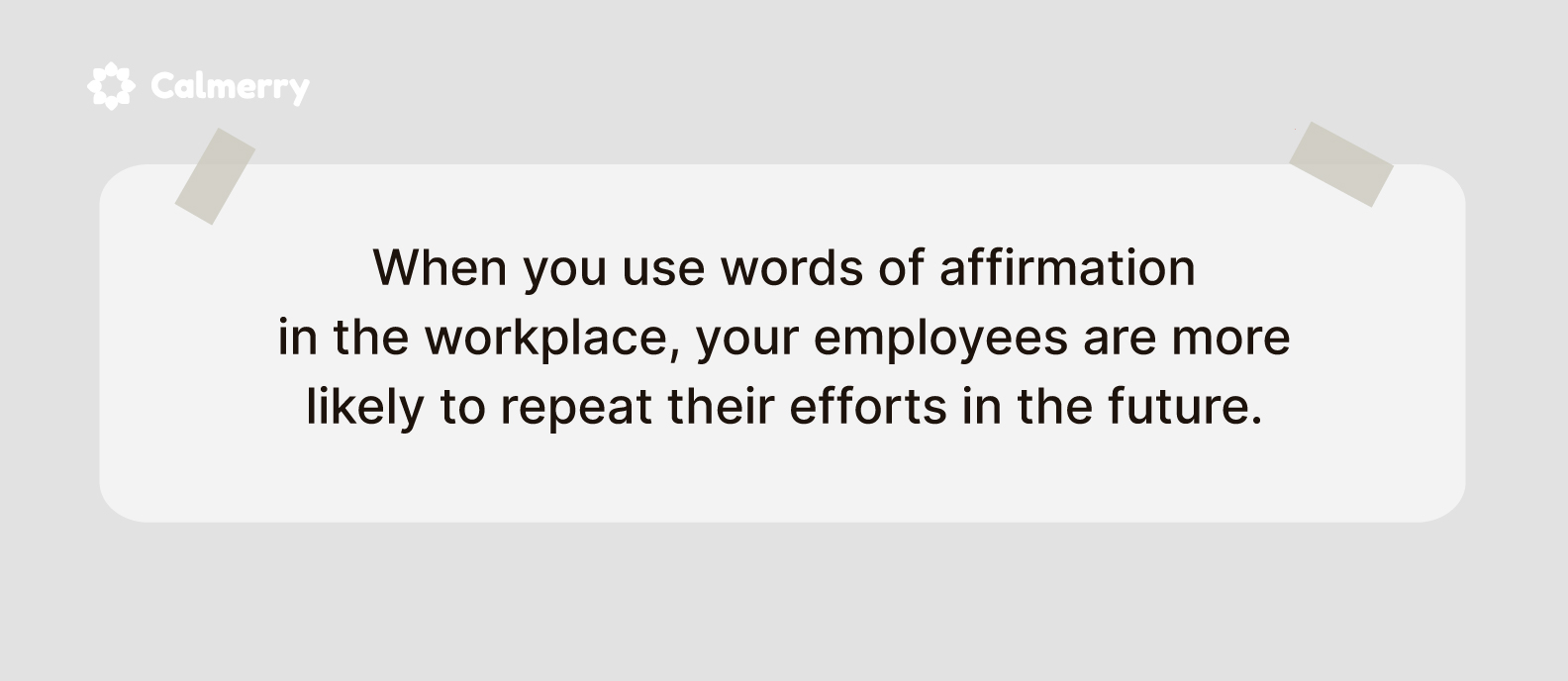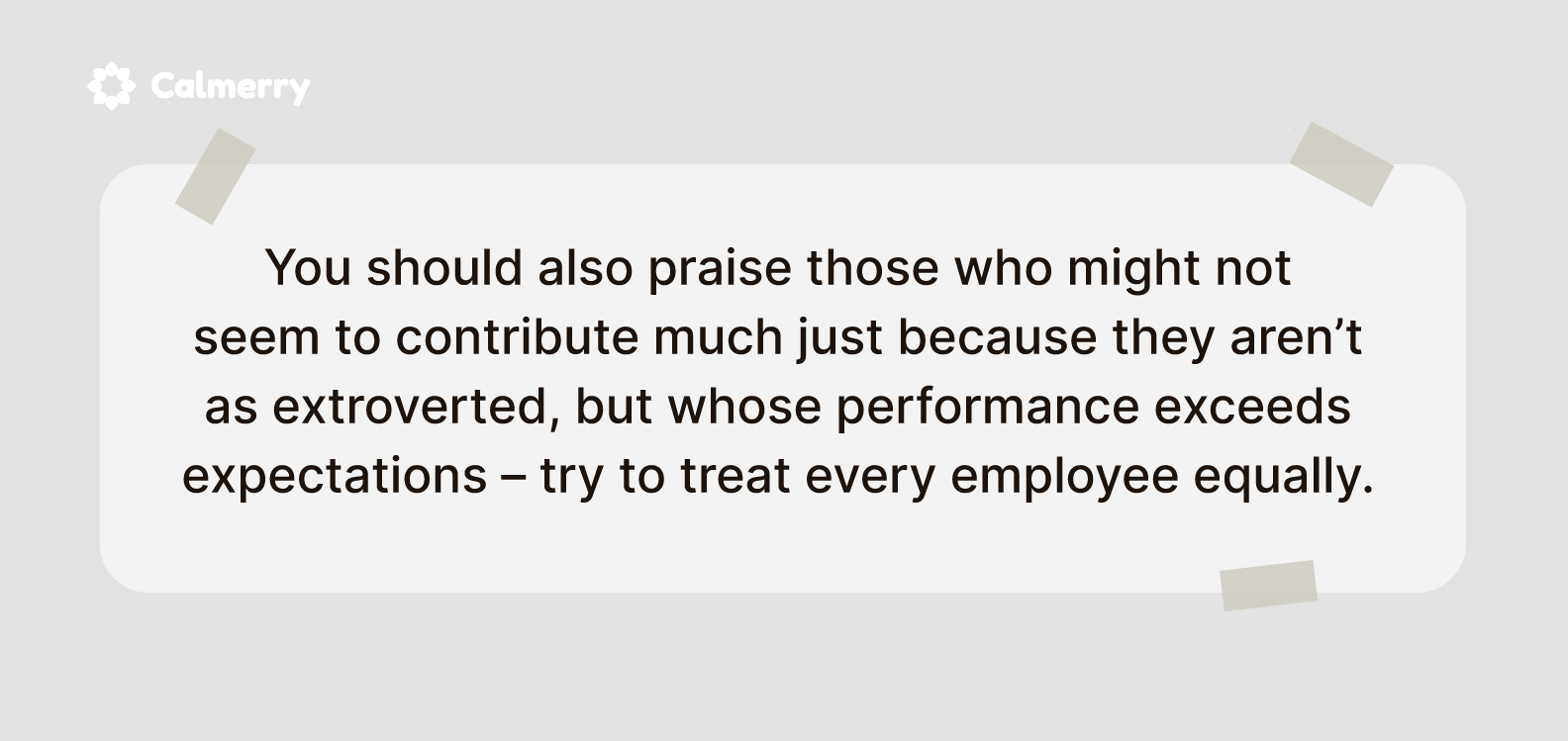6 Ways to Introduce Words of Affirmation to Your Workplace

In this article
The key to every business’ success is keeping employees satisfied and happy because only then they can achieve the desired results. While some companies believe the best way to accomplish it is by introducing flexible working hours or financial bonuses to reward progress, the answer is a bit simpler than that.
We all like being told we’re doing a good job, and so do employees. Verbally recognising their efforts will ensure they’re happy working for your company and they try to improve their performance.
In this article, we’ll focus on how to do it by using the words of affirmation and tell how they promote better employees’ well-being.
What are words of affirmation?
To explain what words of affirmations are, let’s look at love languages first.
In 1995, Gary Chapman published a book called ‘The Five Love Languages’, whose message is that every person has a different way of receiving and showing love in relationships. Since then, the concept grew in popularity and it has recently been applied to workplaces.
The love languages are:
- Words of affirmation: These are verbal acknowledgments of someone’s efforts and value. Even though words of affirmation might not be everyone’s primary language, every employee appreciates when their work is recognised.
- Act of service: Act of service is a way of showing appreciation, for example, by helping an employee with a difficult task.
- Quality time: Quality time means giving someone undivided attention. In the workplace, it can be cultivated by placing value on teamwork and treating all employees like individuals and not like a group.
- Receiving gifts: Receiving a tangible reward for their efforts can encourage employees to continue improving their performance. These can be achieved by implementing a program that allows employees to collect vouchers for every completed task that they can exchange for a product.
- Physical touch: Some employees appreciate it the most when their efforts are acknowledged through appropriate physical touch. For example, a boss can shake their hand to congratulate them or give them a high five.

Why are words of affirmation important?
Employees whose efforts aren’t recognised might struggle with low self-esteem and eventually burn out. Ideally, a workplace should use all of the above types of affirmation, but verbal praise might be the most important way of appreciating their work.
The evidence that it plays a significant role in your company’s success comes from several studies. According to the analysis conducted by The Gallup Organization, employees who receive regular praise increase their productivity and engagement, have fewer accidents on the job, are more likely to stay within the organisation and receive higher satisfaction scores from customers.
In other words, praise can boost motivation and translate into career growth.
What’s more, findings from another study suggest that employees value non-monetary incentives such as recognition of good work as much as they value financial rewards.
The above findings can be explained by the concept of positive reinforcement, which was first explored by the psychologist B.F Skinner who researched how different types of conditioning affect behaviour.
Positive reinforcement happens when a positive stimulus is followed by the desired behaviour.

How to introduce words of affirmation to your workplace
Words of affirmation might not be everyone’s preferred love language. But there isn’t a single person who doesn’t like being told that they’re doing a good job. And in a professional setting, affirmations can help boost morale and increase productivity.
Here’s how you can use words of affirmation in the workplace.
1. Acknowledge employees’ efforts and praise their performance
Performance reviews are an essential part of your business as they allow you to identify areas for improvement. However, a lot of companies see such reviews as something to be ticked off the list once a year instead of a regular occurrence that can provide valuable insight.
For this reason, the best way to introduce words of affirmation to your workplace is by prioritising frequent feedback.
The first step is to set up regular meetings, in which you can praise your employees’ performance and suggest room for improvement. Make sure that you acknowledge their effort by recognising the work they put in and how challenging it was.
Even if the current results aren’t the quality you expect from them, it’s a good idea to provide constructive feedback and ask if there’s anything you could do to help them improve.
Additionally, performance reviews should be an opportunity to set goals. Setting goals allows your employees to feel included and more secure about their future. It also demonstrates that you recognise their dedication and want to invest in their development further.
When it comes to how to word performance praise, remember not to use a negative tone and be specific.

The examples of recognition and positive affirmations for work include:
- ‘X completes tasks with great attention to detail, which allows the company to be more efficient’.
- ‘I can tell how much effort you put into completing this task and even though it was challenging, you’ve done an amazing job’.
- ‘I really appreciate your work so far, especially the way you handled the recent case’.
- ‘X always comes up with new ideas during meetings which help to push the business forward’.
2. Recognise personal attributes
If you want your employees to be more invested in your company’s success, you should work on creating a friendly and supportive work environment.
One of the ways you can achieve it is by praising your employees for their personal attributes. For example, you can tell them you appreciate the way they manage their team, help their colleagues or their optimistic nature. This can give them more confidence and help them reach their full potential.
This kind of workplace affirmation is also essential because people can’t always be at their best and produce the same results every single time. When an employee is recognised for their personality traits despite having a bad day, it helps them feel validated and appreciated even though they might be falling behind.
3. Ask for their feedback

Even though every workplace has a hierarchy, everyone is a part of one big team with a shared goal. Asking your employees for feedback on a project is another way to use words of affirmation in the workplace. And it’s important because it can help them feel included.
Additionally, it shows that you value their expertise, respect their contribution to the company’s success and that you trust their judgement.
For example, you can let them know that you appreciate their opinion and would love to hear their thoughts on the changes you’re planning on implementing.
It’s also a good idea to ask employees for regular feedback on the way your company operates and congratulate them on being insightful.
4. Reward their efforts
People like being rewarded for their job and effort. And if you combine a reward with workplace affirmation, you can be sure that your employees will feel appreciated.
The type of reward you can offer might depend on what kind of business you run. But everyone enjoys being given an extra break or getting the days off they requested: ‘You’ve been working really hard on this project, which is why I’d like you to give yourself an extra day off to reward your effort’.
5. Promote a culture of recognition
Encourage your employees to praise each other for their efforts by writing words of appreciation and placing them in an ‘appreciation box’. You can read them out in the performance review meeting and reaffirm what has been said with your own feedback.

For example, if one of the employees wrote that they appreciate that their co-worker is always ready to help them with difficult tasks, acknowledge how they make everyone feel included and how their efforts translate into a more efficient overall performance.
This kind of practice will also help you justify any future promotions and motivate other employees to repeat the same behaviours.
6. Support your employees’ mental health
A part of implementing words of affirmation in the workplace is supporting your employees’ mental health.
Their well-being should be the priority. When someone’s well-being suffers, they can’t perform their tasks as efficiently as before. Additionally, taking an active interest in your team’s personal life makes them feel more supported.
Pay attention to any changes in behaviour and kindly comment on them, having an employee’s best interest in mind. For example, you can say something like, ‘I’ve noticed that you’ve been looking a bit down for a while. I’m happy to discuss any additional support you might need’.
If it turns out that your employee is, in fact, struggling, provide them with the help they need – such as access to self-help materials or online therapy.
Calmerry will help your employees build mental resilience, maintain motivation, and improve their mental well-being for a more balanced life.
online therapy
live video session



